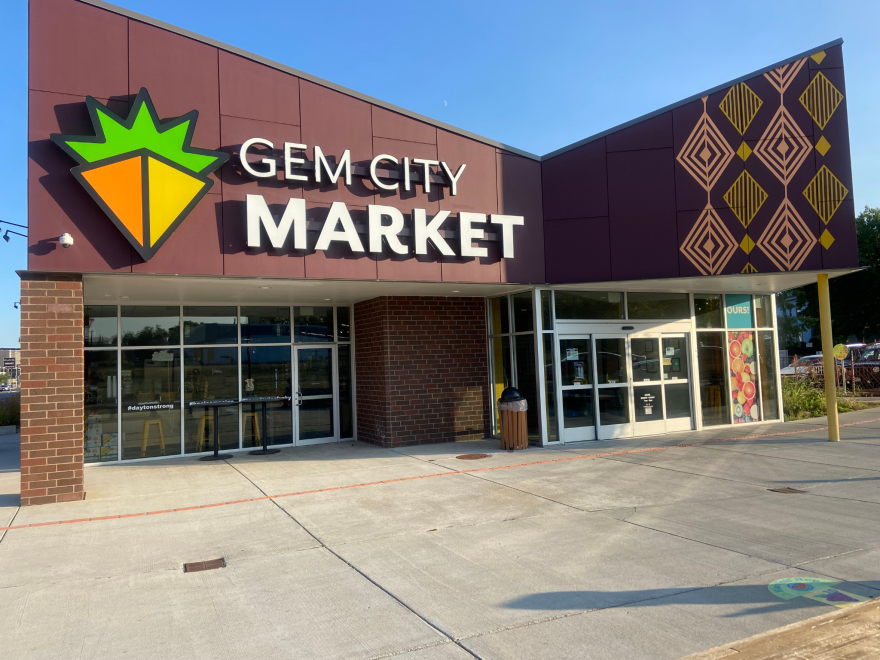
Climate change is affecting our food, and our food is affecting the climate. WYSO and the NPR network are dedicating a week to stories and conversations about the search for solutions.
Eating less meat can slash your carbon footprint, and Black Americans have been leading the trend adopting this climate friendly diet.
A Pew Research Center study found that 8% of Black people identify as vegan or vegetarian in comparison to only 3% of the general population.
In Dayton, local businesses are noticing a similar trend in Black communities.
Gem City Market, a community-owned grocery store in northwest Dayton, is seeing increased sales of vegan and vegetarian products.
“The demand has risen since we opened for vegan and vegetarian items,” said Michelle Heath, purchaser at the Gem City Market, who has worked at the store for three years. “One of our biggest sellers has to be our jackfruit options, which come in a variety of flavors like Tex-Mex and barbecue.”
The market is located in a predominantly Black area designated as an opportunity zone. Before Gem City Market opened, the surrounding area was a food desert. The nearest full-service grocery store is about 3.5 miles away or a 10 minute drive.
For Heath, accessibility means everything for nearby residents.
“It’s close to a number of senior citizen buildings,” she said. “There are many different families that live over here, and it’s within walking distance for their children to send them to the store to get things, which is really hard to do now in other neighborhoods.”

Despite the increasing interest in vegan diets, navigating the grocery aisles for plant-based options can be a challenge. Heath says the Gem City Market plans to offer more education to help customers make healthier choices and save money.
“It’s surprising to know that a lot of people don’t know how to shop for food” she said. “So, having someone there that teaches them how to shop for food, as well as prepare it or even plan meals, is an amazing money saver, like you wouldn’t believe.”
Accessibility is also at the top of mind for Black-owned vegan businesses in Dayton.
Shamika Milliner is the owner of Your Vegan Chef. She runs the only restaurant in West Dayton with 100% vegan options.
“I am full time but I’m only here at the restaurant certain days out of the week.There is another business. She’s also open on the weekends. We are the main full-time vegan restaurant locations in the Dayton area,” Milliner said.
As an entrepreneur and a consumer, Milliner challenged herself to look into the impact of meat consumption.
“I’ve definitely researched how it impacts the overall environment and how such a negative impact. But depending on who you’re talking to, it’s sometimes hard to convert the masses or bias opinions about the negatives of meat and what we’re not supposed to consume,” she said.”But I do believe it does affect us.”
 A cooler contains shelves of vegan options at the Gem City Market.
A cooler contains shelves of vegan options at the Gem City Market.
Rhea Adkins, owner of Vegan It Iz Eats, has a different journey in becoming a vegan.
She runs her business out of the 2nd Street Market in downtown Dayton. Through a church initiative, she got her feet wet with veganism through the Daniel Fast.
“That’s where you pretty much give up everything—sugar, bread, meat, dairy, all of the above.”
There are many studies showing the health and environmental benefits of eating more plants and less meat.
Globally, food is responsible for about a quarter of carbon emissions, according to the Yale Program on Climate Change. Animal-based foods are responsible for twice as many emissions as plant-based foods.
“Be open to trying different things because it’s definitely a wonderful lifestyle to have.”
But both Milliner and Adkins face unique difficulties in sourcing ingredients.
Milliner says she can usually find vegan ingredients for day-to-day restaurant operations. But getting enough for catering jobs can be hard and limit her ability to serve more customers.
“For the most part, I don’t have a hard time finding ingredients, but sometimes it can be difficult to find a large supply, especially if I need it quickly.”
Adkins adds, “When the pandemic happened… some things are either just not affordable or they just don’t have them.”
Despite these challenges, both women are dedicated to making vegan food within reach.
For Adkins, she plans to offer classes to teach the community how to make consistent vegan options at home.
“I love to teach people how to create things on their own,” she said. “The reason why we can’t continue is that we don’t know the tools it takes to maintain it.”
Milliner is setting her sights on expanding Your Vegan Chef with more packaged foods and possibly a food truck in the future. She’s confident that vegan food can be both familiar and enjoyable for all.
“Be open to trying different things because it’s definitely a wonderful lifestyle to have, especially a good healthy lifestyle, but it doesn’t have to be bland,” she said. “It’s also flavorful… It kind of tastes like home.”




